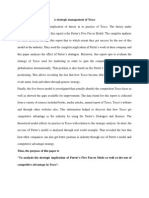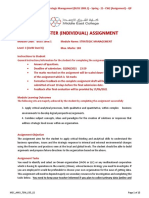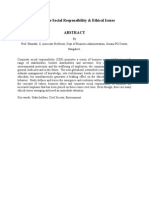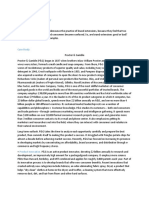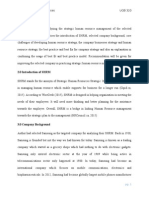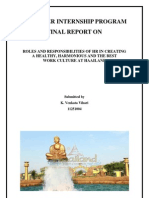Virgin
Virgin
Uploaded by
MahqueCopyright:
Available Formats
Virgin
Virgin
Uploaded by
MahqueCopyright
Available Formats
Share this document
Did you find this document useful?
Is this content inappropriate?
Copyright:
Available Formats
Virgin
Virgin
Uploaded by
MahqueCopyright:
Available Formats
Virgin Group Ltd is widely known for its presence in a vast array of global markets that include music,
radio, and mobile services, among others. The leadership and management tactics of the company are often covered by the media for its track record of success and efficiency. The Virgin brand was founded in 1968 and is now recognized worldwide for its success in many different industries. Sir Richard Branson is the current chairman of the company and is well known for his colourful yet competitive leadership style. Many scholars and business analysts attribute the Virgin Groups success to the innovative leadership style of Branson. He often took on risky business ventures in an attempt to diversify and add value to the company. His business plan is to focus on very small segments of a particular market and doing a high quality job at providing the product or service. This concept is able to gain small monopolies on a market share and often creates very high profit margins (Werdigier, J). Contributing to his success was his ability to lead people to innovate and grow. This philosophy sets the tone for the management team within the company. The organizational culture of Virgin Group is quite complex. Virgin Group serves as a parent company of over 100 separately run companies that operate in industries that are often completely unrelated. The common denominator within each company is the Virgin Brand. The brand is similar or identical within each separate operation. This symmetry serves as a guideline for the image that each division or department is expected to represent. This image is one of quality and innovation (Virgin). By creating an exceptional brand, the company is able to create a high level of loyalty within its customer base. The diversity of businesses operated by Virgin Group helps the company maintain a high level of loyalty in many different industries. This is the ultimate reason why company has seen a high level of success throughout is many different business ventures. Managers within the company use the concept of innovation to inspire the employees to contribute to the company at all levels, rather than just doing what they are told. Employees can contribute to the cutting edge products that the company creates as well as look for new ways to increase the overall efficiency of the company. The Virgin Group has been able to create a management style that encourages employees to be competitive. This also gives people the desire to see the company succeed in order to be a contributor to a fresh and creative business model.
There is a solid distinction between leadership and management within the Virgin Group. Transformational leadership comes from the top managers and executives within the company. Richard Branson along with other company executives has set many common
goals for the company to achieve as a whole. These ambitious goals include expansion into international markets, utilization of new technology, loyalty among customers, and joint ventures with other companies. Goals of this level are voiced to all people involved with the company. This has a benefit to the company by giving everybody involved a challenging mission to accomplish. The highest level of management encourages employees to use their skills in a way that will best compliment the company. The idea behind this is to promote the philosophy that the overall benefit of the company will lead to individual benefits for each person involved. Group contribution will eventually lead to rewards for executives, managers, employees, shareholders, and customers alike.
The lower level management positions tend to focus more strictly on the management side of the company. Leadership is encouraged among managers, but it often takes strict management to get the job done. Each management function varies within the different divisions in the company. Managers at the Virgin Group have a wide range of goals to pursue. Because each division within the company varies in its specialization it takes well trained managers to run it effectively. Managers hired by the company tend to have a solid background in their area of specialization. They also need to have a history of proven management experience to be considered for a position. Ultimately, managers within the Virgin Group deal with managing the day to day tasks required to keep their division running efficiently.
Organization is a crucial component to the success of the Virgin Group. Because the company is very complex, organization is critical step in the planning process to be considered. First, the company has a wide range of goals it wants to achieve as a whole, such as creating brand loyalty and expanding to a global level. The top executives are in charge of determining these goals and explaining them to the rest of the company. In order for the goals to be received well by the employees, executives must be confident that the goals can be achieve while simultaneously making them challenging. The purpose of this is to give people the sense that they are involved in an important and meaningful task. Second, these goals must be organized within each division. Each division will have separate specialized goals on how to increase their market share and improve their product or service in the process. As you move down the supply chain the goals become more specific and short term. This system of organization keeps the company on track to achieve the top level goals set by executives.
The success of the Virgin Group over the years has proven this to be an effective organization system for the company. The planning function of management is the first step to creating a winning team of managers. As mentioned before, planning at the highest level is done by the top executives within the company. The complexity of the Virgin Group requires detailed planning at multiple levels in the business. Strategic planning is done by executives, which is voiced to every person involved with the company. This allows all employees to understand what their mission is in the broadest sense. From there, planning must be done for each individual division within the Virgin Group. For example, Virgin Trains, which is a railroad operator in the United Kingdom, has a set of goals that is specific to the business that they deal with. Their goals will differ substantially from that of Virgin Mobile, which will need to take much different steps in order to become a successful business. Each division of the company shares the same brand and is responsible for maintaining the integrity of the brand and increasing customer awareness of the Virgin brand. Planning at every level of the company ensures that each division has specific goals and the steps needed to complete each goal.
The organizing function is also very important to the company. A high level of organization is needed at all levels of the operation. For example, each division needs to organize their management structure. This is often done by trial and error to determine the most efficient ratio of managers to non-managers. When the proper determination is made the company can organize its management structure in order to meet the highest level of efficiency.
Leading is perhaps the most interesting and important function of management to the Virgin Group. The leadership dynamics start with Chairman Richard Branson. He is a very vocal and flamboyant leader. His mission is to inspire those who work below him to work to the best of their abilities for the good of the company. He often pushes his belief that by contributing to the good of the company it will increase the rewards for everybody involved. He has stated that he tries to bring the best out of people and does this for workers at the lowest levels as well as the top ranking executives. This philosophy is encouraged to all managers within the company. Management is expected to embrace this principle and pass it on to the employees that they are managing. Another aspect of Bransons leadership style is that he tends to give people a high level of freedom in their work (Carmichael, E). It is his goal to first give them direction in their work, and then let them take control of the situation
there after. Freedom in their work allows them to excel without the need for micromanagement. Richard Bransons leadership style and vision for the company has made him the centre of attention within many business and management discussions throughout the world.
The controlling function of management is the least important function to the Virgin Group. As a whole, controlling is often felt to be unnecessary by top level management. The company believes that employees should have a certain amount of freedom to make choices for the good of the organization. It is this freedom and decision making that has the potential to bring out the best in an employee. Branson has stated that if an employee does not excel at their work they should be given another chance with a different job within the company (Carmichael, E). This innovative thinking helps to create a healthy organization structure.
Managers can utilize many different strategies to maintain a healthy organizational structure. My first recommendation would be transformational leadership. Transformational leadership allows groups of people to work together for one common goal. By working together a group can come together to achieve great things and improve their overall efficiency. This differs with transactional leadership where individuals are rewarded for their personal performance. This type of leadership can lead to greed and a lack of teamwork. My second recommendation would be to utilize delegation. Delegation is a great way to develop the skills of employees. When management can determine where a person will be most efficient it will help those involved in the project. By putting people in the jobs that they a best suited for it will lead to a more enjoyable and effective working environment.
In summary, there is a lot to be learned from the management and leadership of Virgin Group Ltd. Chairman Richard Branson has created a unique management formula that has contributed to the long term success of the company. Although there is a clear distinction between management and leadership, the company has been able to integrate a blend of each in many aspects of the business. The transformational leadership has proved to be a valuable tool for executives, managers, and workers alike. Employees within the company have a willingness to work together to expand and improve the company in order to reach their own personal success in life. Richard Bransons leadership secrets
British entrepreneur Richard Branson has turned his Virgin brand into a conglomerate of more than 350 companies. His unique leadership style requires some studying:
He never pigeonholes himself. He signed the Sex Pistols to a recording contract when he was in his 20s and then went on to become both a retailer and an airline executive.
He says that he never listens to critics. The first severe criticism against him came when he launched his Virgin Atlantic airline in 1984, when one critic wrote, A brand cant stand for music stores, airlines, mobile phones, colas, financial services, and on and on. No brand on earth can do that. Thats ego. Branson didnt listen, and he proved that critic wrong.
He is a sponge for new ideas. He keeps a notebook in his pocket and jots down every promising idea he hears. Good ideas come from people everywhere, he says, not in the boardroom.
By Richard Branson I am often asked if I have found a secret or at least a consistent answer to successfully building businesses over my career. So Ive spent some time thinking about what characterizes so many of Virgins successful ventures and, importantly, what went wrong when we did not get it right. Reflecting across 40 years I have come up with five secrets. No. 1: Enjoy What You Are Doing.
Because starting a business is a huge amount of hard work, requiring a great deal of time, you had better enjoy it. When I started Virgin from a basement flat in West London, I did not set out to build a business empire. I set out to create something I enjoyed that would pay the bills. There was no great plan or strategy. The name itself was thought up on the hoof. One night some friends and I were chatting over a few drinks and decided to call our group Virgin, as we were all new to business. The name stuck and had a certain ring to it.
For me, building a business is all about doing something to be proud of, bringing talented people together and creating something thats going to make a real difference to other peoples lives. A businesswoman or a businessman is not unlike an artist. What you have when you start a company is a blank canvas; you have to fill it. Just as a good artist has to get every single detail right on that canvas, a businessman or businesswoman has to get every single little thing right when first setting up in business in order to succeed. However, unlike a work of art, the business is never finished. It constantly evolves. If a businessperson sets out to make a real difference to other peoples lives, and achieves that, he or she will be able to pay the bills and have a successful business to boot. No. 2: Create Something That Stands Out.
Whether you have a product, a service or a brand, it is not easy to start a company and to survive and thrive in the modern world. In fact, youve got to do something radically different to make a mark today. Look at the most successful businesses of the past 20 years. Microsoft, Google or Apple, for example, shook up a sector by doing something that hadnt ever been done and by continually innovating. They are now among the dominant forces. No. 3: Create Something That Everybody Who Works for You is Really Proud of. Businesses generally consist of a group of people, and they are your biggest assets. No. 4: Be a Good Leader.
As a leader you have to be a really good listener. You need to know your own mind but there is no point in imposing your views on others without some debate. No one has a monopoly on good ideas or good advice. Get out there, listen to people, draw people out and learn from them. As a leader youve also got to be extremely good at praising people. Never openly criticize people; never lose your temper, and always lavish praise on your colleagues for a job well done. People flourish if theyre praised. Usually they dont need to be told when theyve done wrong because most of the time they know it. If somebody is not working out, dont automatically throw him or her out of the company. A company should genuinely be a
family. So see if theres another job within the company that suits them better. On most occasions youll find something for every single kind of personality. No. 5: Be Visible.
A good leader does not get stuck behind a desk. Ive never worked in an office Ive always worked from home but I get out and about, meeting people. It seems I am traveling all the time but I always have a notebook in my back pocket to jot down questions, concerns or good ideas. If Im on a Virgin Atlantic plane, I make certain to get out and meet all the staff and many of the passengers. If you meet a group of Virgin Atlantic crew members, you are going to have at least 10 suggestions or ideas. If I dont write them down, I may remember only one the next day. By writing them down, I remember all 10. Get out and shake hands with all the passengers on the plane, and again, there are going to be people who had a problem or have a suggestion. Write it down, make sure that you get their names, get their e-mail addresses, and make sure the next day that you respond to them. Of course, I try to make sure that we appoint managing directors who have the same philosophy. That way we can run a large group of companies in the same way a small business owner runs a family business keeping it responsive and friendly. When youre building a business from scratch, the key word for many years is survival. Its tough to survive. In the beginning you havent got the time or energy to worry about saving the world. Youve just got to fight to make sure you can look after your bank manager and be able to pay the bills. Literally, your full concentration has to be on surviving. Obviously, if you dont survive, just remember that most businesses fail and the best lessons are usually learned from failure. You must not get too dispirited. Just get back up and try again. 2010 Richard Branson Richard Branson Simon Hobbs meets the Virgin Group founder British billionaire, space entrepreneur and hot air balloon champion Richard Branson is the founder of Virgin Group, a leading global branded venture capital organisation. Established
in 1970 as a mail order record retailer, the Virgin Group now spans 29 countries and total revenues for 2006 exceeded 10bn (14.8bn).
SIMON HOBBS: What makes a great leader, in your view? RICHARD BRANSON: Someone whos good with people. If you like people, if youre good at motivating and looking for the best in people, if you dont criticise people, then youll make a good leader. SH: How do you raise standards if youre reluctant to criticise? RB: People know when theyve done wrong and dont need to be told. SH: I see youve been described as a transformational leader, a maverick who likes informality and a bottom-heavy structure with fewer managers. RB: We have a very flat structure. Business schools have examined how Virgin does things, and I suspect that were not that radical. I mean, yes, people are allowed to dress as they feel comfortable. Its much better that people have their own individual style. I dont understand how the tie ever caught on. SH: The success of the Virgin brand is staggering. How many companies do you have at the moment? RB: Um, we have nearly 400 companies, I think, now. We try to run everything under the principle that small is beautiful. Our record company ended up as 15 different companies in 15 different buildings and so we managed to stay small but overall became quite large. SH: The entrepreneurial zeal youve shown right from the beginning is amazing. By 16 you were publishing a magazine and by 20 you had a mail order record company.
RB: Look, I was 15, I was dyslexic, the Vietnamese War was taking place. I didnt like the way we were being taught in school and thought Id leave school and start a magazine to campaign against the war. SH: So it wasnt about money? RB: No, I wanted to be an editor but I had to become a publisher in order to make sure that my magazine survived. SH: Was the launch of Virgin Atlantic in 1984 a watershed because it was a very different type of industry with heavy fixed costs? Did the way you dealt with business change at that point? RB: If you learn how to run one business well, you can run any business well. Business is all about people. So, if youre going to get an airline, make sure that you get, as I did, the chief technical officer from British Caledonian to run it. SH: Didnt you have to sell Virgin Records in 1992? RB: We had a dramatically bumpy ride, including an engine exploding on the very first flight, which practically bankrupted us. And when British Airways launched their dirty tricks campaign against us we had to chip in Virgin Records to show that we had the muscle to stay around. SH: What is extraordinary is that you remain the face of Virgin and thats how many people relate to the brand. How do you feel about that? RB: I am the face of Virgin, but we have 60,000 people around the world and 350 managing directors. They are given enormous freedom and freedom to make mistakes. They run the companies as if they are their own companies. SH: Youre not a big fan of stock markets, are you? RB: Twenty-five years ago we floated Virgin Records and doubled our share prices, then the share price halved in the October, 1987 crash. I couldnt see the logic of it, so we went back to private, but we have companies that are public and have done very well, such as Virgin Mobile.
Personally, I will not be a director on the board. Its not my style. I havent attended a board meeting for 20 years. I know what Im good at and I know what Im not good at. SH: Is Virgin Galactic still happening? Will I be able to orbit round the earth at the end of 2009? RB: You will. Its quite exciting actually, because were now only seven months away from unveiling the spaceship and bringing it out of its hangar. SH: And I presume youve already seen it? Is it already built? RB: Actually, its very, um obviously there will be extensive testing before we fly, but interestingly, because were building it in America, though its 100% British-owned, for the first few months I was not allowed to see the plans because of American military security. SH: And against this youve got this desire to do something about carbon footprints. Why make that decision? RB: A couple of years ago Al Gore said: Look, youre a globally well-known business person and can make a grand statement that will bring the rest of the business community on board. I thought: Hang on a minute. Were in the dirty business; lets go and invest all that money into clean fuels, and if we can come up with one that works and we can take on the oil companies, then we can create a whole new business that would work anyway. SH: Finally, what is the one piece of advice you would give to a young person? RB: Have a go, fall flat on your face, pick yourself up and try again. Dont be afraid of failure.
You might also like
- CAREER GUIDANCE PROGRAM Developed by Samuel B. BataraDocument5 pagesCAREER GUIDANCE PROGRAM Developed by Samuel B. BataraSamu Bata94% (77)
- Angelinka-BUS4011-Marketing Dynamics Assignment-Poster 3,000 WordsDocument2 pagesAngelinka-BUS4011-Marketing Dynamics Assignment-Poster 3,000 Wordstaposhirahman432No ratings yet
- ETHICS IN BANKS & FINANCIAL INSTITUTIONS-FULL Version Sharable 2 PDFDocument25 pagesETHICS IN BANKS & FINANCIAL INSTITUTIONS-FULL Version Sharable 2 PDFElanthamizhan s0% (1)
- Global Strategy and SustainabilityDocument21 pagesGlobal Strategy and Sustainabilityshanzayharoon786No ratings yet
- KARAN PESHWANI - Offer LetterDocument6 pagesKARAN PESHWANI - Offer LetterKaran PeshwaniNo ratings yet
- VirginDocument11 pagesVirginNeil Heywood100% (2)
- Appendix P - HSE Management PlanDocument39 pagesAppendix P - HSE Management PlanMohammed100% (6)
- Workplace Culture: Lead-InDocument1 pageWorkplace Culture: Lead-InNoah MirandaNo ratings yet
- Leadership Complexity and Change - Mandhu CollegeDocument13 pagesLeadership Complexity and Change - Mandhu CollegeMohamed AbdullaNo ratings yet
- 4564-2469-13-00-40 - SQA IMM Assignment Only V3 Turnatin FileDocument36 pages4564-2469-13-00-40 - SQA IMM Assignment Only V3 Turnatin FileHussain K.JamalNo ratings yet
- Leadership in Vodafone by Amin BDDocument5 pagesLeadership in Vodafone by Amin BDnalaminsNo ratings yet
- 7.1 The Kirkpatrick Model of Training Evaluation For Report-TATADocument25 pages7.1 The Kirkpatrick Model of Training Evaluation For Report-TATAatomosk2901No ratings yet
- Entrepreneurship, Resistance To Change and Growth in Small FirmsDocument17 pagesEntrepreneurship, Resistance To Change and Growth in Small FirmsQuỳDướiChânPhật100% (1)
- Virgin's Human Resource ManagementDocument16 pagesVirgin's Human Resource ManagementTrang Phan Nguyen0% (1)
- A. Value Chain Analysis of Procter and Gamble Case StudyDocument4 pagesA. Value Chain Analysis of Procter and Gamble Case StudyNav J KarNo ratings yet
- Virgin AtlanticDocument15 pagesVirgin AtlanticTahmida DUNo ratings yet
- A Strategic Management of TescoDocument11 pagesA Strategic Management of TescoKompal Naveen100% (1)
- GoogleDocument4 pagesGoogleAlifa MugiaNo ratings yet
- Saji Leadership and ChangeDocument16 pagesSaji Leadership and Changekochanparambil abdulNo ratings yet
- Supplier Relationship Management Thesis Korthals Wouter S3762335Document51 pagesSupplier Relationship Management Thesis Korthals Wouter S3762335Cristian Paul Bolimbo PalgaNo ratings yet
- Apple Company Leadership Change - Edited 1 .EditedDocument13 pagesApple Company Leadership Change - Edited 1 .EditedFun Toosh345No ratings yet
- 761 Tesco Developing Appropriate Leadership StylesDocument5 pages761 Tesco Developing Appropriate Leadership StylessahlaNo ratings yet
- Sample Assignment - Leadership and ManagementDocument36 pagesSample Assignment - Leadership and Managementfearless23052005No ratings yet
- Research On Corporate Social ResponsibilityDocument27 pagesResearch On Corporate Social Responsibilitychiragec25100% (1)
- Special Report: Strategic Planning Readiness-Assessment ChecklistDocument3 pagesSpecial Report: Strategic Planning Readiness-Assessment ChecklistSyed RadibNo ratings yet
- Sealed Air Diversey Merger Acquisition Presentation Slides Deck PPT June 2011Document40 pagesSealed Air Diversey Merger Acquisition Presentation Slides Deck PPT June 2011Ala BasterNo ratings yet
- Outsourcing Issue #18Document47 pagesOutsourcing Issue #18sritharanNo ratings yet
- Personality of A Leader - OB AssignmentDocument13 pagesPersonality of A Leader - OB AssignmentSantosh RajputNo ratings yet
- Tesco Training and DevelopmentDocument3 pagesTesco Training and DevelopmentIustin EmanuelNo ratings yet
- PESTLE Analysis For TescoDocument3 pagesPESTLE Analysis For TescoGerly-Dennis Balansag0% (2)
- Marketing AssignmentDocument50 pagesMarketing AssignmentishmeetvigNo ratings yet
- Intended Strategy DevelopmentDocument8 pagesIntended Strategy DevelopmentMubeen MusthakeemNo ratings yet
- Managing Innovation Teams at Disney Case Analysis: William R. Cook NETW583 Strategic Management of TechnologyDocument6 pagesManaging Innovation Teams at Disney Case Analysis: William R. Cook NETW583 Strategic Management of TechnologyReyansh SharmaNo ratings yet
- Malaysia As Outsourcing DestinationDocument10 pagesMalaysia As Outsourcing DestinationRahul PearceNo ratings yet
- Samsung ReportDocument6 pagesSamsung ReportDaman BrarNo ratings yet
- AquarisDocument6 pagesAquarisMahesh DharapNo ratings yet
- SM Buss 1009.1 Cw2 Assignment Spring 21Document15 pagesSM Buss 1009.1 Cw2 Assignment Spring 21Arsl331No ratings yet
- 568Document10 pages568d1740246No ratings yet
- Critique Paper - People FirstDocument7 pagesCritique Paper - People FirstMhild GandawaliNo ratings yet
- Broad Leadership CompetenciesDocument13 pagesBroad Leadership CompetenciesJulian A.No ratings yet
- Strategic Leadership - AssignmentDocument23 pagesStrategic Leadership - AssignmentPradeep AthurugirigeNo ratings yet
- Sundar Pichai - Ceo of GoogleDocument11 pagesSundar Pichai - Ceo of GoogleMEGHNA SHOKEENNo ratings yet
- Case StudyDocument16 pagesCase StudyalimlokaNo ratings yet
- Yahoo Case Analysis Anja Rosengaard FogDocument8 pagesYahoo Case Analysis Anja Rosengaard Fogapi-251463862No ratings yet
- Assignment On HRM PracticeDocument24 pagesAssignment On HRM PracticeSnowboy Tusher50% (2)
- Corporate Social ResponsibilityDocument7 pagesCorporate Social ResponsibilitySri KanthNo ratings yet
- What Is Corporate Governance?: Key TakeawaysDocument1 pageWhat Is Corporate Governance?: Key TakeawaysFatima TawasilNo ratings yet
- The Talent Masters-The Talent Masters-Book Review by Mandeep SinghDocument9 pagesThe Talent Masters-The Talent Masters-Book Review by Mandeep SinghMandeep SinghNo ratings yet
- HBS Millennium Case AnalysisDocument4 pagesHBS Millennium Case AnalysisDeepak Arthur JacobNo ratings yet
- ANSOFFDocument2 pagesANSOFFAntonio Paraschivoiu0% (2)
- Porter's Five Forces Analysis: Force 1: The Degree of RivalryDocument9 pagesPorter's Five Forces Analysis: Force 1: The Degree of RivalryKajal ShakyaNo ratings yet
- Dark Side of Relationship MarketingDocument5 pagesDark Side of Relationship MarketingAbhishek KhandelwalNo ratings yet
- Management Practices - DSIDocument15 pagesManagement Practices - DSIIndumini DilshaniNo ratings yet
- Assessment 1 Strategic MarketingDocument17 pagesAssessment 1 Strategic MarketingTamika InglisNo ratings yet
- Samsung Sustainability Report 2015 - Eng - PeopleDocument36 pagesSamsung Sustainability Report 2015 - Eng - PeopleIrisVe100% (1)
- Chapter: Creating Brand EquityDocument3 pagesChapter: Creating Brand EquityJAMIL AHMEDNo ratings yet
- CASE 3 Arsenic and Old Lace Case StudyDocument3 pagesCASE 3 Arsenic and Old Lace Case Studykhadafy undaNo ratings yet
- Amazoncom CaseDocument11 pagesAmazoncom Caseobros_bps2003No ratings yet
- Walmart HR Functions Case StudyDocument10 pagesWalmart HR Functions Case StudyDhrupad Kaneriya DKNo ratings yet
- BBE Assignment 2Document18 pagesBBE Assignment 2phuc waytoodankNo ratings yet
- OB Task 1Document21 pagesOB Task 1AdelinaPredescu100% (1)
- Cultural Intelligence - Expatriate Challenges and Diversified Workforce ManagementDocument8 pagesCultural Intelligence - Expatriate Challenges and Diversified Workforce ManagementShEny HiNeNo ratings yet
- Strategic Human Resources UGB 320Document13 pagesStrategic Human Resources UGB 320Vance RollinNo ratings yet
- ASSL-HSE - PLN-002 - CASHES Plan-ABC 06Document35 pagesASSL-HSE - PLN-002 - CASHES Plan-ABC 06Toyin OjoNo ratings yet
- Change Management Leadership GuideDocument30 pagesChange Management Leadership GuidesavassakarNo ratings yet
- HRM Chapter 4Document73 pagesHRM Chapter 4Bao Thuan HuynhNo ratings yet
- Aggregate Planning and EOQDocument14 pagesAggregate Planning and EOQEngr Muhammad EhsanNo ratings yet
- in Re EscalaDocument2 pagesin Re EscalaJanelle100% (1)
- Imtiaz Supermarket PakistanDocument10 pagesImtiaz Supermarket PakistanAdil DogarNo ratings yet
- MOA Bakersfield BROKER - BUILDER Final EditedDocument2 pagesMOA Bakersfield BROKER - BUILDER Final EditedRamon Guanzon CondeNo ratings yet
- Astillero vs. Meg@VPS Security Agency.10 Nov 17Document18 pagesAstillero vs. Meg@VPS Security Agency.10 Nov 17reginaNo ratings yet
- Equipment Training Policy and ProcedureDocument13 pagesEquipment Training Policy and Proceduremonir61100% (1)
- Tholons Whitepaper Outsourcing Multiplier 2011Document15 pagesTholons Whitepaper Outsourcing Multiplier 2011Amana PatNo ratings yet
- HR Coordinator JD May22Document3 pagesHR Coordinator JD May22nibrajarifinnafisNo ratings yet
- Sri Lanka Tourism Vision 2025Document33 pagesSri Lanka Tourism Vision 2025oshadaNo ratings yet
- Human Resource AccountingDocument11 pagesHuman Resource AccountingSidharth RadhakrishnanNo ratings yet
- Employer Employee Relationship MBA Projects BBA Project ReportsDocument4 pagesEmployer Employee Relationship MBA Projects BBA Project ReportsAman SinghNo ratings yet
- Final Report SampleDocument42 pagesFinal Report SampleVenkata VihariNo ratings yet
- MBA Final Project-SharmilaDocument90 pagesMBA Final Project-SharmilaSharmila SNo ratings yet
- Ayesha Parveen CB642034Document27 pagesAyesha Parveen CB642034Ali HassanNo ratings yet
- Jurisdiction - CFLDocument80 pagesJurisdiction - CFLanailabucaNo ratings yet
- Internship Report On Customer Relationship Management of VMCDocument69 pagesInternship Report On Customer Relationship Management of VMCJason Jason100% (1)
- Employee Benefits and Compensation IdeasDocument13 pagesEmployee Benefits and Compensation IdeasannieNo ratings yet
- Introduction To Strategic ManagementDocument13 pagesIntroduction To Strategic ManagementcellouNo ratings yet
- The Importance of Soft SkillsDocument12 pagesThe Importance of Soft Skillsshindedattatri100% (1)
- Safety Officer Pravin - CVDocument4 pagesSafety Officer Pravin - CVpravinNo ratings yet
- Employee Monitoring: Privacy in The WorkplaceDocument6 pagesEmployee Monitoring: Privacy in The WorkplaceEverettNo ratings yet
- CV AntaDocument2 pagesCV Antaanta.sarasa foreverNo ratings yet

















